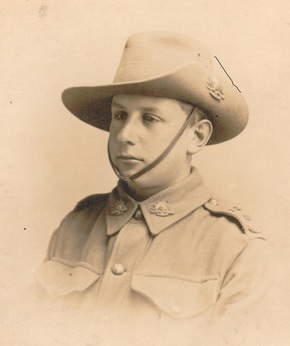ROOK, George Fredrick
| Service Number: | 3113 |
|---|---|
| Enlisted: | Not yet discovered |
| Last Rank: | Private |
| Last Unit: | 13th Infantry Battalion |
| Born: | Islington, London, 17 December 1897 |
| Home Town: | Dural, The Hills Shire, New South Wales |
| Schooling: | Merchant Taylors |
| Occupation: | Orchard Hand |
| Died: | Heart Attack, Sydney, 29 September 1965, aged 67 years |
| Cemetery: | Not yet discovered |
| Memorials: | Norwest Mitchell Remembers Roll of Honour |
World War 1 Service
| 6 Sep 1915: | Involvement Private, 3113, 13th Infantry Battalion, --- :embarkation_roll: roll_number: '11' embarkation_place: Sydney embarkation_ship: HMAT Ballarat embarkation_ship_number: A70 public_note: '' | |
|---|---|---|
| 6 Sep 1915: | Embarked Private, 3113, 13th Infantry Battalion, HMAT Ballarat, Sydney |
Help us honour George Fredrick Rook's service by contributing information, stories, and images so that they can be preserved for future generations.
Add my storyBiography
George arrive in Australia from England in 1914, and went to live at the Govt Demonstration Orchard , Dural. Like a lot of young men, he followed the lead of several others from the Govt Demonstration Farm. He enlisted on 23 July, 1915 10th Reinforcement /13th Battalion 1st AIF, trained at Liverpool before boarding HMAS Ballarat for Egypt. Was going to Gallipoli but due sickness was return back to Egypt, join the battalion when they returned from Gallipoli and then went to France in 1916.
While in Egypt, he mentioned regularly seeing Lawrence of Arabia
Served with the 13th Battalion for the duration of the war. Believe was under the supervision of the the Quarter Master and was a driver for Colonel Douglas Gray Marks. He was responsible for "Rolf " a doberman pincer, renamed "Digger" by the 13th, which was captured by the Australians. He always said it was pretty savage. After its death, Digger was stuffed and can now be found in the Australian War Memorial and is on display at regular intervals.
George was responsible for taking many photos during the war years and the Rook family donated his photo album to the Hazelbrook RSL after his death. It is believed that the photo album eventually was sent to the Australian War Memorial and one of the photographs he took of Colonel Douglas Marks and "Digger" now appears in a recent publication "The Boy Colonel" by Will Davies.
During the was George was hospitalised in UK for schrapnel wounds and effects of mustard gas.
George returned to Australia in 1919. At the outbreak of WW11, he tried to enlist. Because he was working in a protected industry, he was not allowed to join up for active service overseas. Instead he joined up here in Sydney remaining in Australia and was L'Sgt, Power House, C Company 7th Battalion for the duration of WW11.
During my child hood, I was priviledged to meet many of the diggers from the 13th Battalion.









